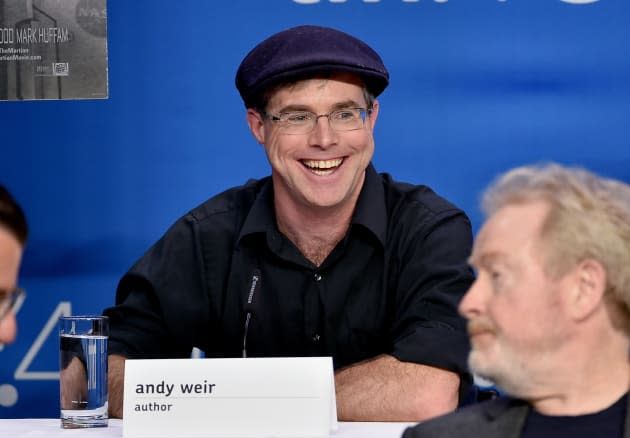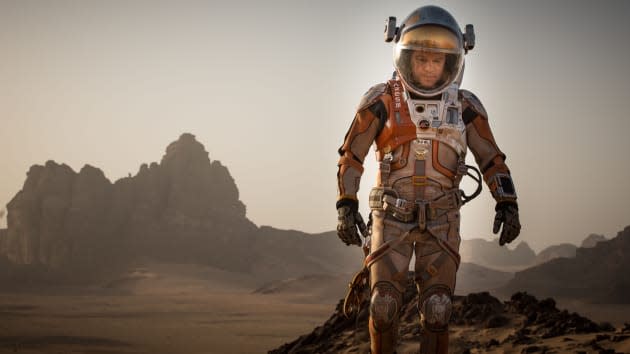'The Martian' author Andy Weir: Private space travel is 'critical'

The Martian is the sort of success story that will inspire countless authors. Andy Weir initially started writing the story of Mark Watney, a NASA astronaut who gets stranded on Mars, as a free serial on his website. Eventually, fans pushed for him to place it on Amazon's Kindle store, where he offered it for a paltry 99 cents. Soon after that, he had liftoff. It ended up being one of Amazon's best-selling sci-fi books, which led to a major book deal (the print version remains at the top of The New York Times' best-selling paperbacks). Naturally, Hollywood came calling, and now we have Ridley Scott's adaptation of The Martian hitting theaters on October 2nd. And yes, you can relax: The film is more akin to Scott's best work, like Alien and Blade Runner, than his recent follies. In a wide-ranging interview, we chatted with Weir about the book, the state of NASA and the importance of commercial space travel.

What was the inspiration for focusing on one guy being stranded on Mars?
Well man versus nature and a guy stranded alone is not a new concept. But basically ... I'm a space dork, and I was plotting out how can we do a manned mission to Mars with our current technology. Not for a book or anything; it was just me on my couch. ... I was working out all the details on how to get him there, keep him alive and how to get back and stuff. And I thought any mission plan needs to account for failures and problems. ... What's the fallback if this thing breaks? ... What if these two things break at the same time? How do we make sure the crew doesn't die? These situations seemed pretty interesting, so I created an unfortunate protagonist and subjected him to all of it.
How much were you involved with the production of the film? Did you work together with [screenwriter] Drew Goddard?
Drew talked to me frequently. ... They didn't have to include me at all, but they chose to. Drew talked to me pretty much every day when he was working on the screenplay. And then when he finished it, he sent [revisions] of it to me for feedback, and I gave lots of feedback, and he made some changes and ignored others (it's his screenplay). ... And while they were filming the movie, they would occasionally send me questions of deeply technical stuff, because I'm a good source for that. Other than that, I was just mostly an outsider eagerly watching the process unfold.

You've mainly worked in programming so far; what led you to extensively research space?
Well, it comes down to that being my hobby. I've been a space dork my whole life. Ever since I was a kid, I'd watch any documentary I can about space and space travel, manned and unmanned space flights. It's easy to research things you're interested in. ... So it just comes down to writing what you know, and that's what I know.
I appreciate how much you stress scientific accuracy. How did you go about balancing that with the greater plot and having so many characters?
That was probably the hardest part of writing the book, because I at times had to do weeks of work to come up with the solution and to figure out the science behind something, and it turns out to be one sentence. And there's a part deep down that says: "Damn it! It took me this long to write this; it should take you a long time to read it!" (laughs) But you've got to resist that urge. Basically, I decided readers need to understand the situation, but they don't need to become researchers in this field. I can't deluge them with information. I need to give them just the information they need so they can understand what's happening, and tell them that detail in a snarky, sarcastic tone, because that's Mark Watney's personality, so that it doesn't sound like a Wikipedia article. It needs to be fun.
Since the book has come out, we've learned a lot more about Mars, especially about the wider availability of water. How would those discoveries have changed the book? [Note: This interview was conducted before NASA announced liquid water was found on Mars' surface.]
Basically, the limited amount of water was a major plot line in the book, but it turns out you wouldn't have needed it. There's plenty of water. ... The whole hydrazine-reduction thing, that was an awesome plot, so I'd want to keep that and instead do a bit of a hand wave and say there's a lot of water in other places on Mars, but not on Acidalia Planitia [the plain where Watney is stranded]; it's a desert. ... So I'd say there wasn't as much water as there is in Gale Crater, where Curiosity landed. It's probably false; there's probably plenty of water, but I'd say you can't prove me wrong until you send a probe to Acidalia. There are also new technologies developed by NASA in the past few years. ... They can just pull CO2 out of the air without expendable filters now.
There's a lot of NASA love in the book and in the film, and I appreciate that as a space nerd. The Pluto mission was a big thing to rally around, but beyond that NASA just hasn't gotten much attention lately. Do you see that as a problem with how the general public looks at space travel?
Well people like to see new things happen. We've had ISS [the International Space Station] up there for years. It feels like, to the layman, that NASA hasn't done anything really new, or accomplished anything very significant in a long time. Now building a big-ass space station is actually really hard. There's also kind of a bruised national pride that we don't have a manned spaceflight program anymore. I think you'll see interest in NASA get rekindled once the Orion program [NASA's latest manned capsule] gets up and running, and we actually start sending our own astronauts back into space without hitching a ride with the Russians.

Private space travel is becoming a bigger topic these days; how do you see that working together with public programs like NASA?
I think commercial space travel is critical. We're not really going to do much in space at all until the price to low-Earth orbit gets driven down. Right now it's just so damn expensive, there's no economic incentive to go into space. So any missions are just governments spending money they're not going to recoup. But if you can drive down the price, then there will be a commercial space enterprise and economics will see to it from there. If you can imagine a scenario where, for $50,000 you can go into space and spend a week on a space hotel, like a space station. And the whole process were as safe for you as international [air] travel is today. I think people would be lining up to do that. There would be infinite demand.
It all comes down to driving down the cost of getting stuff into low-Earth orbit. That's what these commercial companies will do, since they're competing with each other. A government has different objectives. The folks at SpaceX are doing a great job at driving these costs down. ... Once that happens, then agencies like NASA could say: "We want to send astronauts to Mars. Well, we need to put 300 kilograms of a big-ass spaceship into orbit. Hey SpaceX, we need eight launches for these parts. We're going to spend $20 billion building this space station, and we'll pay you $5 billion to put it into orbit."
[Photo credits: Kevin Winter/Getty Images, Andy Weir; Aidan Monaghan/Twentieth Century Fox, The Martian]
